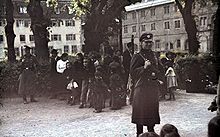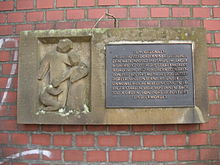- Sinti
-
Sinti o Sinta (masc. sing.=Sinto; fem.sing.=Sintisa) es el nombre de la población gitana en Europa.[1] Tradicionalmente nómada, hoy tan solo un pequeño porcentaje del grupo lo es. En tiempos pasados, frecuentemente vivían en las afueras de comunidades, generalmente en la miseria.
Los sinti hablan un dialecto del idioma romaní llamado Romanes, Sintenghero Tschib(en), que tiene un vocabulario primario romaní pero algunas diferencias gramaticales, con una acusada influencia del alemán.
Contenido
Etimología
El origen del nombre "sinti/sinte" es incierto. Puede haber sido adoptado en el siglo XVIII y posiblemente a partir de un lenguaje secreto basado en el alemán. Suele compararse con el nombre de la etnia sindhi, del sudoeste de Pakistán, opinión extendida entre la población sinti, pero sin ninguna evidencia hasta la fecha.[2]
Historia
 Ravensburg, Memorial por los sinti asesinados en Auschwitz.
Ravensburg, Memorial por los sinti asesinados en Auschwitz.
Los sinti llegaron a Alemania y Austria en la Edad Media, divididos en dos grupos: Eftavagarja (los de las siete caravanas) y Estraxarja (los de Austria). Estos dos grupos se expandieron: los Eftavagarja a Francia, donde se les llama Manouches y los Estraxarja a Italia (región Piamonte) y Europa del Este, principalmente hacia Croacia, Hungría, Rumanía, República Checa y Eslovaquia, adoptando nombres distintos en cada lugar.
Otras teorías
Otra teoría sostiene que los romanís difieren de los sinti, en que los primeros se convirtieron al Islam durante la dinastía Seljuq lo que les permitió adquirir la ciudadanía y escapar a la esclavitud. Los sinti rechazarían convertirse al Islam y se mantuvieron como esclavos.[3]
Sintis conocidos
Entre los sintis se encuentran muchos músicos como Drafi Deutscher o el guitarrista de jazz Django Reinhardt y Biréli Lagrène. Häns'che Weis grabó un disco en Alemania a mediados de los años 1970 donde cantaba sobre el Porajmos (holocausto romaní) en su propio idioma y fue la forma en que muchos jóvenes alemanes aprendieran sobre el tema. Titi Winterstein y otros miembros del clan Reinhardt todavía tocan Jazz gitano tradicional y moderno por toda Europa. El teclista Joe Zawinul, es descendiente de sinte (Sintenghero). El futbolista italiano Andrea Pirlo lo es, al igual que el padre del futbolista holandés Rafael van der Vaart.
Véase también
- Categoría:Gitanos
- en:Romani people by country
Referencias
- ↑ Martha Verdorfer: Sinti & Roma (en alemán)
- ↑ Yaron Matras, 'The Role of Language in Mystifying and Demystifying Gypsy Identity' in: Nicholas Saul, Susan Tebbutt, The Role of the Romanies: Images and Counter-images of "Gypsies"/Romanies in European Cultures, Liverpool University Press (2004), ISBN 978-0-85323-679-5, p. 70.
- ↑ Marco D. Knudsen. «Roma Frühgeschichte (1000–1400). Freedom by joining the Islam». RomaHistory.com. Consultado el 14-06-2007.
Bibliografía
- Walter Winter, Struan Robertson (Translator) Winter Time: Memoirs of a German who Survived Auschwitz Hertfordshire Publications, (2004), ISBN 1-902806-38-7
- Reviewed by Emma Brockes "We had the same pain" in The Guardian November 29, 2004
Enlaces externos
 Wikimedia Commons alberga contenido multimedia sobre Sinti. Commons
Wikimedia Commons alberga contenido multimedia sobre Sinti. Commons- Wege nach Ravensbrück Memorias de una mujer sinti superviviente al campo de concentración de Ravensbrück
Categorías:- Gitanos
- Etnias de Europa
Wikimedia foundation. 2010.


